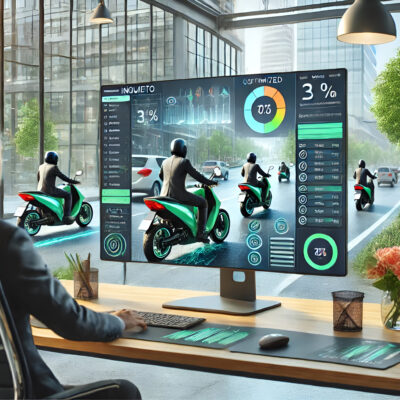The fifth edition of the Annual Mobility Consumer Index survey, carried out by EY, sounding out the opinions of almost 20,000 consumers in 28 countries, reveals that, although some challenges remain, the transition towards more sustainable mobility continues to gain ground. Read on for more revealing survey results!
Sustained growth in a diverse context
The intention to purchase electric vehicles has increased by 2.5% globally compared to the previous edition of the survey, which clearly reflects a growing interest in this mode of transport.
In countries like China, Singapore and France, this increase has been particularly significant, highlighting the role of these markets in the adoption of clean technologies. On other markets such as the United States or Austria, although things have slowed down slightly, the data show that consumers still view electric vehicles as a viable option, opening the door to new opportunities for improvement and development.
What does this mean for the future? Generally speaking, electric mobility is staring to consolidate. Mass adoption is diversifying and the emerging market, with government incentives and infrastructure development, are taking the lead in this change.
Overcoming challenges: price, infrastructure and batteries
According to the survey, although 51% of consumers intend to purchase a vehicle in the next 24 months, interest in electric cars is showing signs of slowing down. The main barriers remain the high price, the lack of a charging infrastructure and concerns about battery life.
However, these obstacles are being addressed through innovations both in business models and in technological terms. For example, the development of new batteries with greater autonomy and an extended shelf life or the new subscription models for batteries are helping to ease consumer fears about replacement costs.
What’s more, the charging infrastructure is constantly improving. The deployment of fast chargers and the increasing connectivity between them enable us to foresee a future in which charging EVs will be as simple as refuelling an internal combustion vehicle.
Spain: a major market for hybrids and electric vehicles
In Spain, interest in electric mobility is still on the up, with 50% of consumers expressing their intention to purchase a new or used vehicle in the next two years. This figure puts the country at the top of the European comparisons, demonstrating the growing commitment of users to sustainable alternatives.
Spain particularly stands out in the preference for Hybrid vehicles (HEV and PHEV), with 48% of users leaning towards this option. Hybrids represent a gateway to full electrification thanks to the numerous advantages they afford, such as reduced emissions without sacrificing range.
The adoption and acceptance of this type of vehicle is the first step towards achieving full electrification. The trend of the Spanish market shows that the transition towards cleaner mobility is an ever more feasible reality. With public policies that encourage the adoption of clean technologies, electric mobility is positioning itself as the future of transportation in the country.
Economic and sustainable motivations
Consumers continue to see clear advantages in electric mobility, with economic motivations constituting a key part of this drive. The report highlights that the hike in fuel prices and penalties for internal combustion vehicles are two of the main reasons why users consider switching to an electric vehicle. Along with the tax incentives and subsidies which many governments are already implementing, thereby making the adoption of electric vehicles increasingly affordable.
As far as the environmental commitment is concerned, more and more consumers are prioritising decisions that favour sustainability. The expansion of electric mobility reflects a widespread commitment to a cleaner environment, adding significant value for those looking to reduce their carbon footprint.
The added value: superior experiences and connectivity
Another of the key aspects highlighted by the survey results is the connectivity that electric vehicles are able to offer. Consumers are very appreciative of new technological features, from smartphone integration to autonomous driving. In this regard, electric vehicles offer a superior user experience in terms of technology and comfort.
As manufacturers develop new models, innovative proposals are also emerging which improve accessibility to electric vehicles. Business models such as battery subscriptions allow users to enjoy all the advantages of electric mobility without worrying about the battery lifespan, an aspect which, in general terms, tends to generate a lot of uncertainty.
Basically, as borne out by the results of the study, the path towards electric mobility is clearly laid out. Interest in electric vehicles keeps growing, driven on by technological advancement, environmental concerns and innovations in business models. With the continuous improvement in charging infrastructure and the increase in the supply of electric vehicles, it is only a matter of time before this form of transport becomes the prevailing option worldwide.




